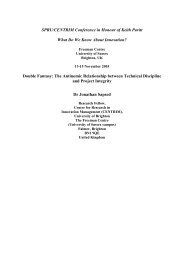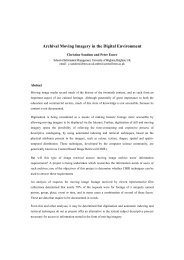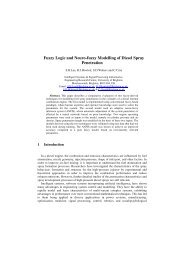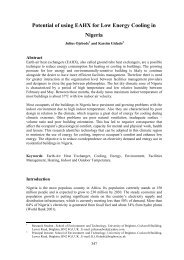NESTA Crime Online - University of Brighton Repository
NESTA Crime Online - University of Brighton Repository
NESTA Crime Online - University of Brighton Repository
You also want an ePaper? Increase the reach of your titles
YUMPU automatically turns print PDFs into web optimized ePapers that Google loves.
Both the international system and its component parts lack the comprehensive<br />
instruments to tackle cybercrime in all its forms. And there is no evidence that they are<br />
doing anything about it. The growing immunity for cybercriminals and the promise <strong>of</strong><br />
easy gains against a backdrop <strong>of</strong> global recession will surely fuel the supply side <strong>of</strong> what<br />
threatens to become a global criminal industry.<br />
But we do need to respond and we need to do so at three levels: international, national<br />
or institutional, and individual.<br />
3.1.1 The international level<br />
Across the world, cybercrime will continue to <strong>of</strong>fer high rewards and low risks both to<br />
organised and to opportunistic criminals. New players are emerging in countries like<br />
India and Brazil and as international financial networks acquire a greater global reach,<br />
such opportunities will multiply. The international response has been weak, given the<br />
scale <strong>of</strong> the problem, and there are no signs <strong>of</strong> preparation to withstand a future<br />
cybercrime onslaught.<br />
Countries do face problems responding collectively in an appropriate and effective<br />
manner. The scale and nature <strong>of</strong> the problem is genuinely transnational – credit card<br />
details stolen in the UK can be processed in Malaysia and used in Australia, while Indian<br />
call centres are thought to be a source for insider fraud. 229 Some <strong>of</strong> the states involved<br />
are failed or weak states and are unlikely to be able to respond even if they wanted to<br />
do so. Although several international organisations have had cybercrime on their<br />
agendas (including the OECD, European Union and G-8 group) they have yet to achieve<br />
consensus and traction on dealing with the problem. As yet, no one state has opted to<br />
take the lead to develop the necessary architecture and political consensus to mount a<br />
sustained campaign against cybercrime. Neither <strong>of</strong> the two Protocols that constitute the<br />
Palermo Convention, for example, address any issues relating to cybercrime. The<br />
international policing organisations, INTERPOL and EUROPOL have yet to develop robust<br />
responses. The European Union did manage to draft a convention on cybercrime in 2002<br />
but, to date, not all member states have ratified the agreement. Moreover, where action<br />
229 As noted in section 2.2.<br />
Page 82
















